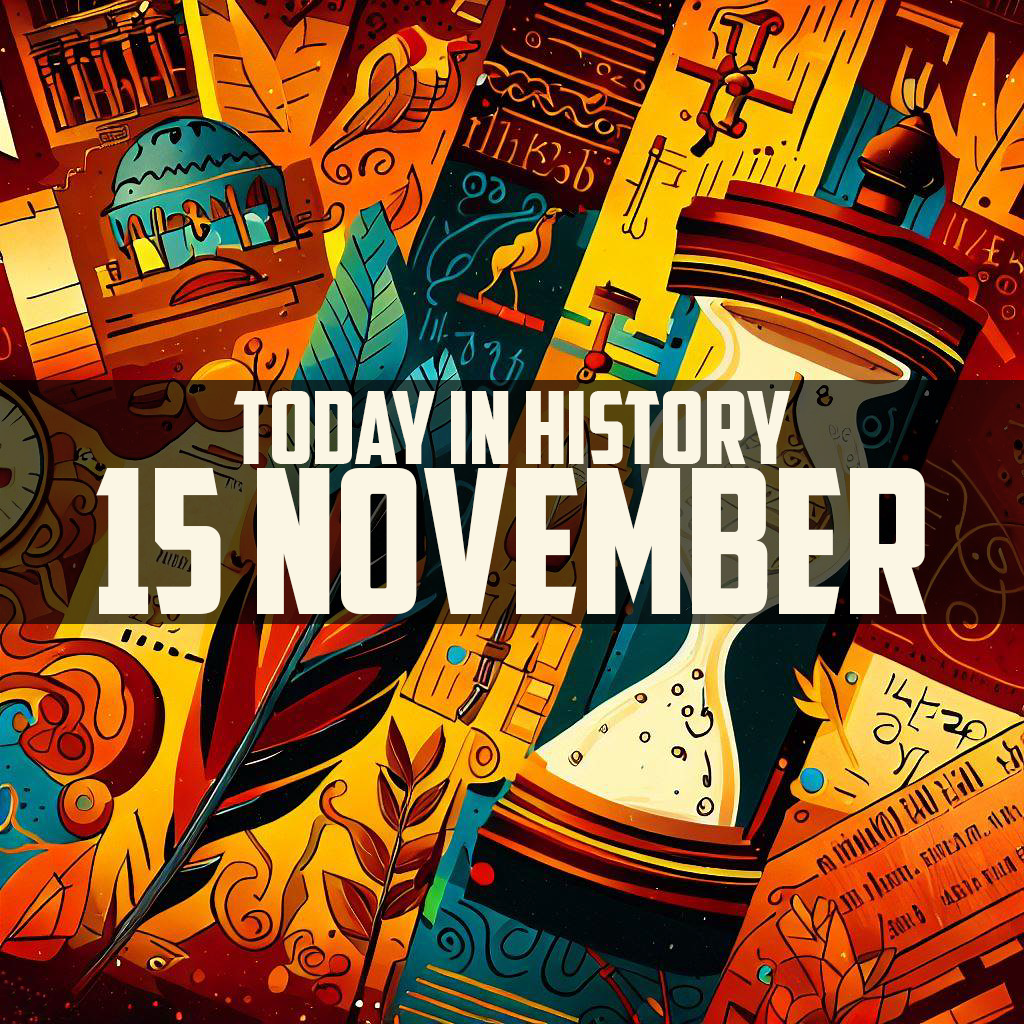15 November holds a tapestry of events that have weaved their way into the annals of history. From political upheavals to groundbreaking discoveries, and from cultural shifts to technological advancements, this day bears witness to the diverse facets of human civilization. Let’s embark on a journey through time, uncovering some pivotal moments that occurred on this day.
Today in History: 15 November

1. 1777: The Articles of Confederation
On this day in 1777, the Continental Congress adopted the Articles of Confederation, the first constitution of the United States, albeit one that would later be replaced by the current U.S. Constitution. This was a significant step for the nascent nation, post its Declaration of Independence, providing a framework for its governance.
2. 1920: League of Nations Assembly
The first assembly of the League of Nations convened in Geneva. Founded in the aftermath of World War I, the League aimed to foster international cooperation and prevent future conflicts. While it ultimately failed to prevent World War II, it set a precedent for international diplomacy and was a precursor to the United Nations.
3. 1969: Vietnam War Moratorium Demonstration
In Washington D.C., over 250,000 demonstrators gathered to protest the Vietnam War. This Moratorium was among the largest anti-war protests in U.S. history, symbolizing the deep divides and fervent activism of the era.
4. 2001: Microsoft Xbox Launch
A landmark in the gaming industry, Microsoft’s Xbox console was released in North America on 15 November 2001. Competing with giants like Sony’s PlayStation, Xbox’s entry transformed the landscape of home gaming and introduced iconic franchises like Halo.
5. 1943: Heinrich Himmler’s Speech
One of the main architects of the Holocaust, Heinrich Himmler, delivered a secret speech to SS officers in Poznan, admitting to the extermination of the European Jewish population. This speech later became key evidence during the Nuremberg Trials.
6. 1988: Palestine Declaration
The Palestinian National Council, in exile in Algiers, declared an independent Palestinian state. While this was a symbolic move, it represented the aspirations of the Palestinian people for nationhood and self-determination.
7. 1738: Sir William Herschel’s Birth
Born on this day, Sir William Herschel was a renowned astronomer who discovered Uranus and hypothesized the existence of infrared radiation. His contributions to astronomy were profound and have left a lasting legacy.
8. 1966: Gemini 12 Mission
NASA’s Gemini 12 spacecraft, manned by astronauts Jim Lovell and Edwin “Buzz” Aldrin, was launched. This mission marked the conclusion of the Gemini program, which was instrumental in the U.S.’s Moon landing endeavour.
9. 1959: “The Sound of Music” Premieres
This iconic musical by Rodgers and Hammerstein premiered on Broadway. Based on the life of the Von Trapp family, it would later be adapted into a highly successful film, becoming an enduring cultural phenomenon.
10. 2006: Al Jazeera English Launch
The international English version of the Al Jazeera news channel was launched. With its distinct perspective, it aimed to bring a more diversified voice to global news, covering regions and stories often neglected by Western media.
11. 1492: The Papal Bull
Pope Alexander VI issued the papal bull “Dudum siquidem,” extending the Spanish rights to the New World. This followed the “Treaty of Tordesillas” and played a crucial role in Spanish colonization and exploration.
12. 1942: Naval Battle of Guadalcanal
During World War II, a naval battle took place between Japanese and American forces near the Solomon Islands. The brutal encounter, which saw losses on both sides, was a pivotal moment in the Pacific War’s broader context.
13. 1971: Intel 4004 Release
Intel released the 4004 microprocessor, a significant stride in the realm of computer technology. As the world’s first commercially available microprocessor, it paved the way for the personal computer revolution.
14. 1949: Nathuram Godse and Narayan Apte’s Execution
These two were executed for the assassination of Mahatma Gandhi, the father of the Indian nation. Their execution was a grim reminder of the religious and political tensions that plagued post-independence India.
15. 1830: The First American Railroad
The first American railroad station, “Mount Clare Station” in Baltimore, was dedicated on this day. It marked the onset of a transportation revolution in the country.

Conclusion
The historical significance of 15 November is a testament to the myriad events, innovations, and movements that have steered the course of humanity. As we recollect these events, it is essential to not only remember the past but also to understand its context, derive lessons, and ensure that history acts as a guiding light for future endeavours and decisions.
